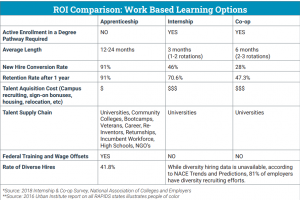The Great Resignation in tech: Can great apprenticeships help?
This is written as the celebration of National Apprenticeship Week commences on November 15th. Before we delve into the state of apprenticeship programs and its significance to today’s tech talent crisis—let’s look at the problem before the opportunity. The pandemic certainly caused many employees in all industries and professions an opportunity to re-access their work-life balance as well as how they may want to live their lives differently moving forward. This has led to what is being coined, “the Great Resignation,” where people are retiring earlier or simply quitting and dropping out of the work force.
This couldn’t come at a worse time for the tech profession—especially for state and local governments. Hundreds of thousands of tech jobs are open and begging for qualified applicants. Before the pandemic the greatest challenge regarding hiring in the public sector was the inability to be competitive with the private sector in terms of compensation. Now it appears money alone is not the key issue it once was as staff burnout from the pandemic appears to be a leading factor in the great resignation phenomenon. Not having the right staff in key positions poses a greater security risk to public institutions who have been battling an epidemic-like cyber-attack frenzy. Outside of cybersecurity the pandemic provided countless examples of how important tech is regarding the business of government as well as the care and feeding of their citizens.
So here we are celebrating the U.S. Department of Labor’s 7th annual National Apprenticeship Week (NAW) where industry, labor, equity, workforce, education and government leaders host events to showcase the successes and value of registered apprenticeship programs aimed at re-building the nation’s economy while advancing racial and gender equity and, at the same time, supporting underserved communities. Perhaps the one word that might be new to some is the word “registered” apprenticeship. Simply put, the registered apprenticeship is a program of the Department of Labor that connects job seekers looking to learn new skills with employers looking for qualified workers. Employers, employer associations and joint labor-management organizations, known collectively as “sponsors,” provide apprentices with paid on-the-job learning and academic instruction that reflects industry needs. The goal of such instruction is to provide workers with advanced skillsets that meet the specific needs of their employers. This year, the Department of Labor is highlighting the theme “Learn-As-You-Earn” during National Apprenticeship Week. Not surprisingly, tech apprenticeships have grown in both relevance and importance.
People often confuse apprenticeships with internships where there are some significant differences. Internships are usually thought of as paid or unpaid opportunities for students to work at a company or public institution for a limited amount of time. By comparison, registered apprenticeships are high-quality work-based learning and post-secondary earn-and-learn models that meet national standards for registration with the Department of Labor. Unlike internships the bond between employer is stronger and retention can be expected. This is an excellent opportunity for state and local governments to seriously consider as they desperately need to hire new tech talent.
In early 2021, the Computing Technology Industry Association (CompTIA) initiated the Apprenticeships for Tech program. CompTIA partnered with one of the nation’s foremost companies in talent development and strategic planning, Maher & Maher, which is supported through funding from the Department of Labor. The partnership developed National Guideline Standards (NGA) for the following entry-level technology careers:
- Tech Support Specialist
- Network Support Specialist
- Cybersecurity Support Technician
- Tech Project Coordinator
The goal is to recruit and help place candidates from unserved communities to work in tech in either the private or public sector. Since the CompTIA Apprenticeships for Tech is federally funded, they can partner at no cost with any potential employer. And they can also use their expertise to help tap into potential funding from federal or state programs to off-set costs associated with developing and operating a registered apprenticeship program. The competencies gained during the apprenticeship are designed to ensure that apprentices are fully qualified for a regular position in the occupation when they graduate from the program.
The Apprenticeships for Tech program presents a great opportunity for state and local governments to consider. While applicants will enter the workforce with negligible skills, they will develop competencies through educational and/or certification programs that can be measured against the established NGAs. As importantly state and local governments have an opportunity to recruit candidates such as women and minorities, in addition to those who never considered tech as an option due to training and believing that you need a college degree first. And tech jobs—even in entry-level positions—pay quite well.
The numbers that show how well apprenticeships work is compelling. According to the Department of Labor, the average starting salary is $72K after an apprentice completes an apprenticeship program, and employment retention is 92 percent of apprentices who retain employment after apprenticeship completion.
The following chart illustrates the ROI that compares the most common types of employment programs. The apprenticeship category shows its many impressive advantages.

So, while National Apprenticeship Week lasts only seven days, it is time to think and plan beyond just a week and look ahead for innovative ways to recruit new tech hires in a win-win scenario.
Dr. Alan R. Shark is the executive director of the Public Technology Institute (PTI) now part of the Computing Technology Industry Association (CompTIA) in Washington D.C. since 2004. He is a fellow of the National Academy for Public Administration and chair of the Standing Panel on Technology Leadership. He is as associate professor for the Schar School of Policy and Government, George Mason University, and is course developer/instructor at Rutgers University Center for Government Services. Shark’s thought leadership activities include keynote speaking, blogging and a bi-weekly podcast called “Sharkbytes.” He is the author or co-author of more than 12 books, including the nationally recognized textbook “Technology and Public Management” as well as “CIO Leadership for Cities and Counties.”




















